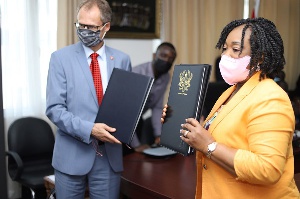 Foreign Minister, Shirley Botchwey (Right) with Swiss Ambassador to Ghana, Philip Stalder (Left)
Foreign Minister, Shirley Botchwey (Right) with Swiss Ambassador to Ghana, Philip Stalder (Left)
Ghana has struck a carbon offsetting agreement with Ghana and Switzerland in what the two nations say is the second deal of its kind under the Paris agreement.
Ghana's Foreign Affairs Minister, Shirley Ayorkor Botchwey, and the
Swiss Ambassador to Ghana, Philip Stalder, signed the agreement during a video conference.
The agreement allows Switzerland to cut down its CO2 emissions partly abroad through climate protection projects in the African country.
This move comes after Switzerland and Peru signed the 'world first' carbon offset deal under the Paris Agreement in October 2020.
Under the Paris Agreement, Switzerland has committed itself to halve its greenhouse gas emissions by 2030 compared to 1990 levels.
The Swiss-Ghana agreement will begin next year to enable the implementation of climate protection projects such as the installation of several hundred thousand decentralized solar systems as part of the "Ghana National Clean Energy Program".
This program is expected to strengthen the expansion of renewable energies and energy-efficient technologies.
President Simonetta Sommaruga witnessed the signing ceremony via video conference from Bern.
Minister of Environment, Science, Technology and Innovation (MESTI), Prof. Kwabena Frimpong Boateng was also present at the ceremony in Accra.
Clear rules for the protection of the environment and human rights
The agreement obliges both parties to use a method that prevents double counting of achieved emission reductions.
It also defines a clear framework for the international transfer of CO2 reductions and their recognition by Ghana and Switzerland.
The treaty establishes criteria to ensure that climate projects do
not harm the environment, ensure sustainable development, and respect human rights.
According to the agreement, there must be no evidence of a violation of human rights or national legislation.
In this case, the transfer of emission reductions from the project in question would be immediately suspended.
These criteria are continuously reviewed over the duration of climate projects.